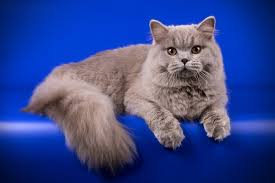
British Longhair
Conditions of detention
British Longhairs are adaptable and can thrive in various living environments, including apartments and larger homes. They enjoy a peaceful atmosphere and appreciate having cozy spots to relax and nap. While they are not as active as some other breeds, they still benefit from interactive play and toys to stimulate their minds.
Useful Fact:
British Longhairs are known for their calm and laid-back nature, making them ideal companions for families and individuals looking for a low-energy but affectionate pet.
Nutrition and diet
British Longhair cats need a balanced diet rich in high-quality proteins to support their muscular build and maintain their coat’s health. A combination of wet and dry cat food is recommended, ensuring they receive essential nutrients and hydration. Fresh water should always be available.
Useful Fact: Omega-3 and Omega-6 fatty acids in their diet can help maintain the luster and health of their long fur.
Health
British Longhairs are generally healthy but can be prone to certain genetic conditions such as polycystic kidney disease (PKD) and hypertrophic cardiomyopathy (HCM). Regular veterinary check-ups are essential to monitor their health and catch any issues early.
Useful Fact: Regular screening for genetic conditions can help manage and prevent serious health issues in British Longhair cats.
Grooming and care
The dense, long fur of British Longhair cats requires regular grooming to prevent matting and reduce shedding. Brushing them several times a week is essential. Regular ear cleaning, nail trimming, and dental care are also important parts of their grooming routine.
Useful Fact: Investing in a high-quality, stainless-steel comb can make grooming sessions more effective and comfortable for your British Longhair.
Education and training
British Longhair cats are intelligent and can be trained to follow basic commands and use litter boxes efficiently. Positive reinforcement techniques such as treats and praise work well with this breed. Consistent training helps them learn quickly.
Useful Fact: Short, engaging training sessions help maintain the British Longhair’s interest and prevent boredom.
Toys and entertainment
British Longhair cats enjoy a variety of toys, including interactive toys, feather wands, and puzzle feeders. Providing climbing structures and scratching posts helps keep them active and entertained.
Useful Fact: Rotating toys regularly can keep a British Longhair cat mentally stimulated and prevent boredom.
Safety
It’s important to keep the home environment safe by removing hazards such as small objects they could swallow and securing windows and balconies. Indoor living is generally safer for British Longhair cats, protecting them from external dangers.
Useful Fact: Microchipping your British Longhair can greatly increase the chances of recovery if they accidentally get lost.
Accessories
Essential accessories for a British Longhair cat include a variety of toys, sturdy scratching posts, comfortable beds, and high-quality grooming tools. Interactive toys and climbing trees are particularly beneficial for their active nature.
Useful Fact: Providing a cat tree or climbing structure can offer a British Longhair both exercise and a sense of territory.
Socialization
British Longhair cats are social and enjoy interacting with their human family. They generally get along well with other pets if introduced properly. Early socialization helps them develop a well-rounded personality and adapt to different environments.
Useful Fact: Regular play and interaction with family members can help reduce stress and anxiety in British Longhair cats, promoting a happy and healthy pet.
Travel and Transportation
British Longhair cats can adapt to travel if introduced gradually. A secure, comfortable carrier is essential for safe transportation. Familiar items like a blanket or toy can help reduce travel-related stress.
Useful Fact: Regular short trips in the car can help a British Longhair cat become more comfortable with travel, making vet visits and other journeys less stressful.
Behavior and psychology
British Longhair cats are known for their calm and affectionate nature. They enjoy a balance of play and relaxation, often forming strong bonds with their owners. Providing mental and physical stimulation is important for their well-being.
Useful Fact: British Longhair cats often enjoy spending time lounging in cozy spots around the house, making comfortable bedding a worthwhile investment.
Legal aspects
Owning a British Longhair involves legal responsibilities such as ensuring they are vaccinated, licensed, and microchipped according to local regulations. It’s important to be aware of any breed-specific legislation in your area.
Useful Fact: Keeping up-to-date records of vaccinations and health check-ups can help ensure compliance with legal requirements and promote the health of your British Longhair cat.


